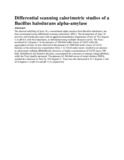| dc.description.abstract | The thermal unfolding of Amy 34, a recombinant alpha-amylase from Bacillus halodurans, has been investigated using differential scanning calorimetry (DSC). The denaturation of Amy 34 involves irreversible processes with an apparent denaturation temperature (T(m)) of 70.8 degrees C at pH 9.0, with four transitions, as determined using multiple Gaussian curves. The T(m) increased by 5 degrees C in the presence of 100-fold molar excess of CaCl2 while the aggregation of Amy 34 was observed in the presence of 1000-fold molar excess of CaCl2. Increase in the calcium ion concentration from 1- to 5-fold molar excess resulted in an increase in calorimetric enthalpy (DeltaH(cal)), however, at higher concentrations of CaCl2 (up to 100-fold), DeltaH(cal) was found to decrease, accompanied by a decrease in entropy change (DeltaS), while the T(m) steadily increased. The presence of 100-fold excess of metal chelator, EDTA, resulted in a decrease in T(m) by 10.4 degrees C. T(m) was also decreased to 61.1 degrees C and 65.9 degrees C at pH 6.0 and pH 11.0, respectively | en |

